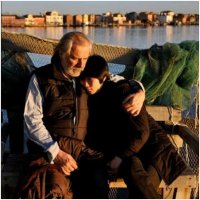Beautiful writing and imagery in the film ‘Io sono Li’
 A good book can often keep me up long past my bedtime, but I must admit that it’s extremely rare that television has the same effect on me.
A good book can often keep me up long past my bedtime, but I must admit that it’s extremely rare that television has the same effect on me.
Still, recently I began watching a film late one night on Italian television, and simply couldn’t tear myself away. It was a simple film, with minimal action and dialogue, but in its simplicity, its imagery, and its language, it kept me riveted to the screen.
I missed this Italian film – Io sono Li (I am Li)- entirely when it was released in 2011, and competed in the 69th Annual Venice Film Festival, where it won three prizes.
This is a beautiful, quiet film about Shun Li, a Chinese immigrant in Italy, who is ‘owned’ by the Chinese mafia. She works in a textile factory in Rome, repaying her smuggling debts to her employers in the all-to-real modern version of indentured servitude. It is these same employers who will decide when she has paid enough to receive, in exchange, the eight-year-old son she left behind in China.
 When Shun Li’s good work is rewarded, she is moved to northern Italy, to the town of Chioggia, to work in a bar frequented by local fishermen. Shun Li is expected to speak Italian – and the thick Venetian dialogue of the zone – well enough to understand the locals, but she is not to form emotional ties.
When Shun Li’s good work is rewarded, she is moved to northern Italy, to the town of Chioggia, to work in a bar frequented by local fishermen. Shun Li is expected to speak Italian – and the thick Venetian dialogue of the zone – well enough to understand the locals, but she is not to form emotional ties.
But in Chioggia, she befriends an old fisherman, a sensitive man dubbed ‘the poet’ by his fellow fishermen. Although the fisherman has been in Chioggia for thirty years, he is also an outsider – from Croatia – who feels drawn to the Chinese woman and her plight.
The unlikely friendship is not understood by the Italian community, and not tolerated by Shun Li’s Chinese employers, who make it clear that any friendships with the locals will set back the date to paying back her debts and the arrival of her son.
This moving, lyrical movie was beautifully shot in the lovely, foggy lagoon near Venice. The film depicts the difficult lifestyle of the fishermen, close to but still worlds apart from Venice’s glamour and elegance.
I also loved how delicately it depicted the difficulties in maintaining strict, cultural borders. As Shun Li’s Chinese roommate notes when she watches the water practicing tai chi on the beach: “When you watch the sea, have you ever noticed that not all the waves that come in go back out? Some of those waves are trapped in the lagoon. And they stay there.”
Like those waves, the sensitive Shun Li is trapped between her two lives, and this beautiful film illustrates these cultural complexities in a quiet, but effective way.
This sounds beautiful. I love crossing culture themes – and partly set up the road in Choggia! I haven’t watched tv for ages but might have a look for this one.
Ha! You might actually understand the dialect (I often had to rely on the Italian subtitles, whereas, scarily enough with my elementary Chinese, the Chinese was actually more clear to me). Guess I’ve become too Roman. : ) It was really a beautiful film. Completely missed it in Venice a few years ago.
I’ll watch out for this. Hope I can find it with English subtitles. The subject matter and story line sound interesting, but your description, “a simple film, with minimal action and dialogue, but in its simplicity, its imagery, and its language…” really grabs me as well.
I’m sure you’d enjoy it, Chris, since I know you also enjoy cross-cultural stories. It kept me up til 2 am one night when I should have been in bed early. : )
That’s the trouble with good books and films. But also a measure of how good they are.